Upali the Barber
10 Jun
I was reading Tulku Drakpa Gyeltsen’s story and when I reached the part where he was ordained as a monk, he was described to be like the second Upali. I googled only discover a lot about this student of the Buddha. He has quite an incredible story of one of the Buddha’s student. It showed how revolutionary the Buddha was for doing away with caste differences and prejudices and ensured that this student was respected for his memory, knowledge and practice. Here’s the incredible account of Upali, the foremost holder of the Vinaya.
——
The Buddha’s disciple Upali is remembered as the patriarch of the Vinaya, the rules of the monastic order. After the death and Parinirvana of the Buddha, Upali recited the Buddha’s rules to the monks assembled at the First Buddhist Council. This recitation became the basis of the Vinaya.
But Upali is worthy of remembrance for more than just his recitation of the Vinaya. He is said to have been born into the Sudra caste, the lowest caste of Hindu society at that time. Under the Hindu law from before the Buddha’s time, a Sudra was not allowed to receive sacraments and considered not worthy of following sacred law. But the Buddha accepted Upali as his disciple and treated him as an equal to disciples born into the highest caste.
Upali the Barber
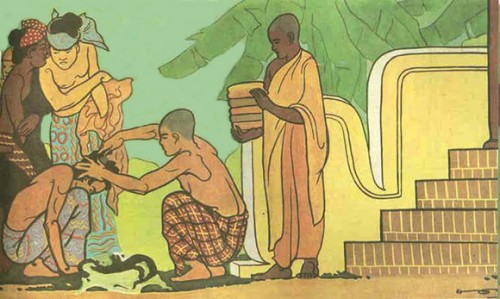
The Sudra were consigned to being servants and laborers. They were not permitted to be educated. However, a Sudra could learn a skill, and Upali chose to learn to be a barber. His skill as a barber earned the patronage of the princes of the Shakya clan in Kapilavastu, where Prince Siddhartha had lived before he became the Buddha.
One day, about three years after his enlightenment, the Buddha returned home. And he needed a haircut. Upali was summoned to the palace. According to Buddhist legend, Upali received his first teaching in meditation as he cut the Buddha’s hair. It is said that Upali quickly mastered the four dhyanas.
After the Buddha left Kapilavastu, several of the princes who were the Buddha’s kinsmen decided to leave the palace and become monks. Upon hearing this, Upali shed a tear.
A prince named Aniruddha, who would become a great disciple in the future, took note of Upali’s sorrow. Aniruddha spread out a blanket and asked the princes to leave their gold and jewels on the blanket for Upali, as a final reward for his good service. And then the princes left.
Upali the Seeker
Upali took up the blanket full of treasure and started to walk home. And then he stopped. If the princes of Kapilavastu could leave all their possessions to become disciples, why couldn’t he? He left the blanket hanging on a tree and turned to find the Buddha.
As he walked, however, he began to doubt. How could the Buddha accept such a lowly person as a disciple? Upali sat down by the road and wept in despair.
The disciple Sariputra found the weeping Upali and asked him what was wrong. Upali asked if a low-caste Sudra could be accepted as a disciple and enter the order alongside the sons of kings and Brahmins.
Certainly, Sariputra replied. Anyone who can keep the Precepts can be a disciple of the Buddha. Then Sariputra and Upali walked together to find the Buddha.
The Shakya princes were still waiting to greet the Buddha when Upali joined them. Then the princes and their former barber were taken to the Buddha, and they bowed at his feet.
The Buddha asked Upali to come forward. Have you come to seek the way? the Buddha asked. Yes, noble sir, Upali meekly replied, if a person of low birth might be permitted to enter the order.
The Buddha told Upali that in the sangha, caste or former occupation did not matter. The only rank that mattered was seniority. And then he said, Upali, receive your ordination now.
Then the Buddha ordained the astonished Upali, right there, before ordaining the Shakya princes, meaning that Upali was now their senior and due obeisance from them. The Buddha told the princes that to leave the world they also had to leave social distinctions and privileges aside.
Upali the Disciple
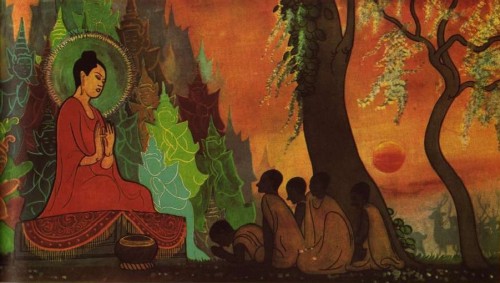
Upali expressed his gratitude by learning and keeping the Precepts. As might be expected, the “rules guy” was not always popular with other monks and nuns. On one occasion word got back to the Buddha that Upali had been treated disrespectfully by other members of the order. So the Buddha gathered the monks and nuns and lectured them on the importance of the Precepts.
As time went on, respect for Upali grew. And when the Buddha had passed, Upali was needed more than ever.
The First Buddhist Council
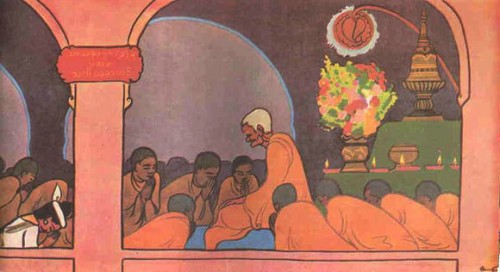
The disciple Mahakasyapa was leading a number of monks to Kushinagara when news of the Buddha’s death reached him. The news caused some monks to grieve, but one monk said he was glad to be able to do as he wished.
Mahakasyapa was disturbed by this remark and worried for the future of the sangha and the Buddha’s teaching. So he convened a great assembly of senior monks, all arhats, to consider how to preserve the teachings and the order.
It was at this assembly that the disciple Ananda recited all of the Buddha’s sermons from memory. And then Upali was asked to recite the monastic rules. The assembled monks agreed that the recitations were accurate.
These recitations became the basis for the Sutra-pitaka and the Vinaya-pitaka of the Pali Tripitaka. Other versions of the Vinaya were preserved in other language traditions as well. The practice of the humble barber Upali sustains the monastic sangha to this day.

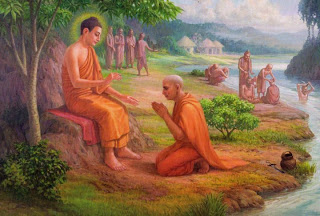
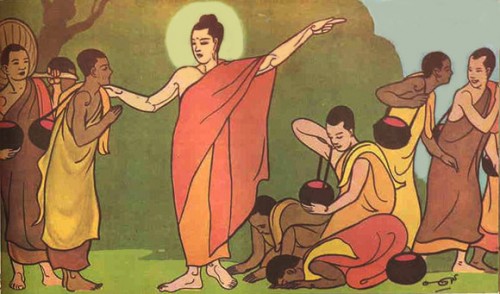




Great read! I always enjoy stories (that are lesser known) from your blog. I look forward to reading more. Thank you Pastor David Lai.